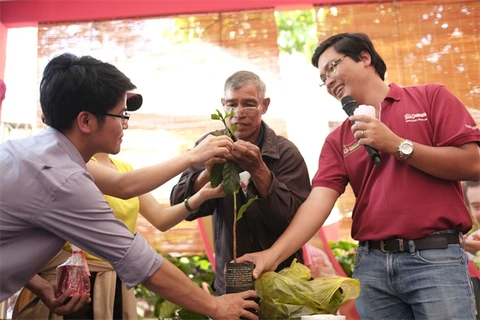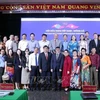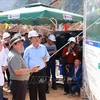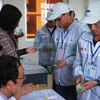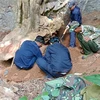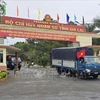 A coffee garden of a farmer in Gia Lai province who is participating in the NESCAFÉ Plan. (Photo courtesy of Nestlé)
A coffee garden of a farmer in Gia Lai province who is participating in the NESCAFÉ Plan. (Photo courtesy of Nestlé) HCM City (VNS/VNA) - In the 10 years since it began NESCAFÉ Plan, a public-private partnership programme between Nestlé, the Ministry of Agriculture and Rural Development, the Western Highlands Agriculture and Forestry Science Institute and other partners, has helped improve the quality of coffee beans and increase farmers’ incomes by 30 percent.
It has so far distributed 46 million high-yield, disease-resistant coffee saplings to farmers and helped rejuvenate over 46,000ha of aged coffee plantations in the Central Highlands, said Pham Phu Ngoc, chief representative of Nestlé Vietnam office for the region.
It has also provided training to over 260,000 coffee farmers in best practices to improve quality and ensure sustainable farming and helped over 21,000 farmers achieve 4C international certification, he said.
Besides, it helps protect the environment by reducing water use by 40 percent and fertiliser and pesticide use by over 20 percent, he added.
Todd Yates, technical director, Nestlé Vietnam, said: “Through NESCAFE Plan, we have also helped further strengthen the reputation of Vietnam as a source of high-quality coffee. Nestlé uses coffee beans produced by farmers under the NESCAFÉ Plan in many of our products which are, in turn, distributed to more than 25 countries across Asia, Europe, the Americas, and Oceania.
“This includes markets with very high standards for quality and compliance such as Japan, Korea, the United States, and several countries in the European Union.”
Phan Tan Luyen, a farmer in Eaktur Commune, Dak Lak province, said: “Following the instructions from the programme’s experts has helped me reduce irrigation costs and use fertilisers properly.
“I have also learnt how to make organic fertiliser from coffee husk to fertilise our coffee trees, which helps reduce disease and increases productivity from three tonnes per hectare previously to 4-4.5 tonnes now.”
Nguyen Hac Hien, deputy director of Dak Lak province’s Crop Protection Sub-department, said: “The programme has brought practical benefits to coffee farmers in Dak Lak, the country’s largest coffee cultivation locality.”
But the province’s coffee sector faces several problems such as small scale of production, ageing coffee trees, poor quality control, and impacts of climate change, he said.
The province has implemented a programme to develop its coffee sector in a sustainable manner. It seeks to enhance co-operation with the NESCAFÉ Plan to help develop its coffee sector, he said.
Binu Jacob, CEO of Nestlé Vietnam, said “Despite the NESCAFÉ Plan’s achievements from the past decade, we are not content to rest on our laurels. We believe that Vietnam, while already the world’s top producer of Robusta coffee, still has a lot of potential to grow.”
His company would continue to add value to Vietnamese coffee by increasing the volume of processed coffee for both the domestic and export markets.
It would work with farmers and other coffee stakeholders to improve and monitor agricultural practices and expand the adoption of sustainable farming methods, drive the circular economy by strengthening sustainability across the coffee value chain from farming to production and bring new product choices to young and demanding local consumers.
“We aim for the NESCAFÉ Plan to help deliver one of Nestlé’s overall goals which is to unlock the power of food to enhance quality of life for everyone today and generations to come.”
Nestlé is the biggest buyer of coffee in Vietnam, buying about 20-25 percent of the country’s total output or 600-700 million USD worth a year./.
VNA
